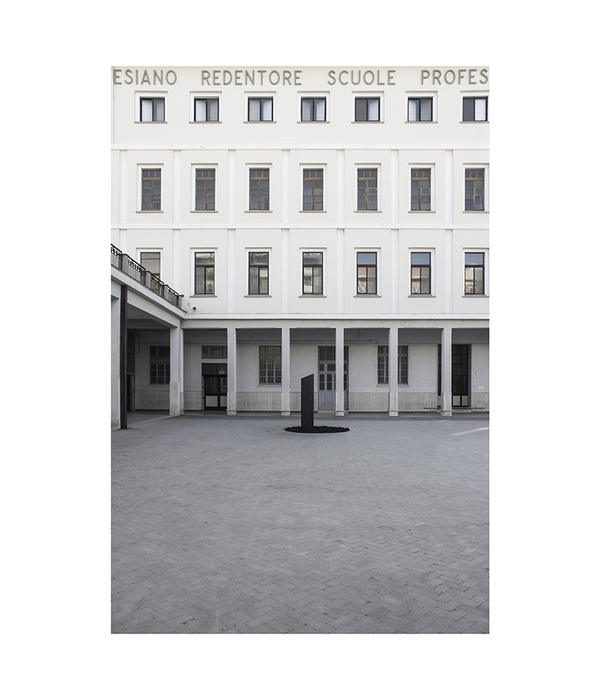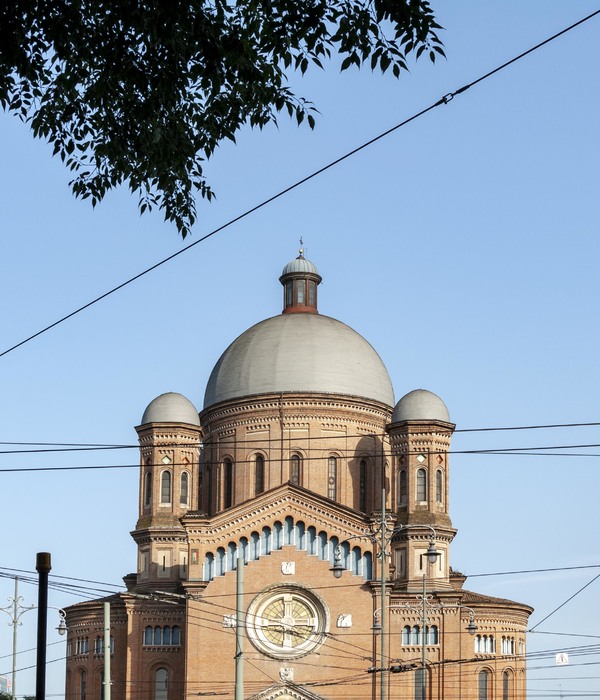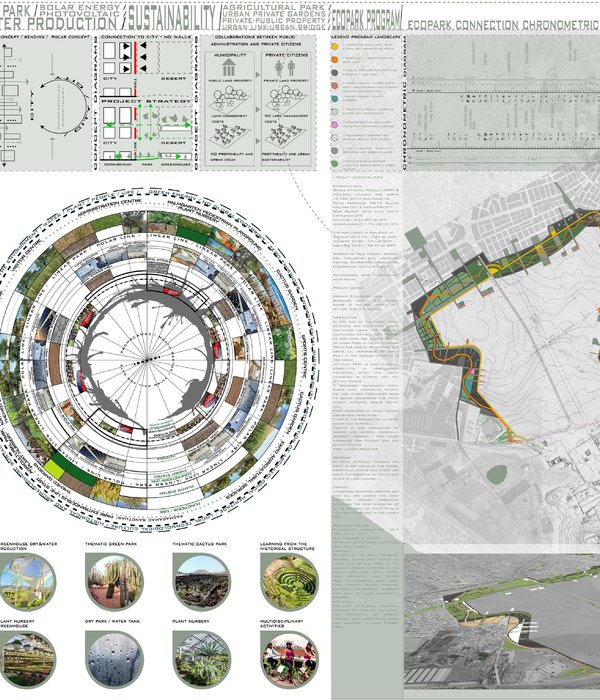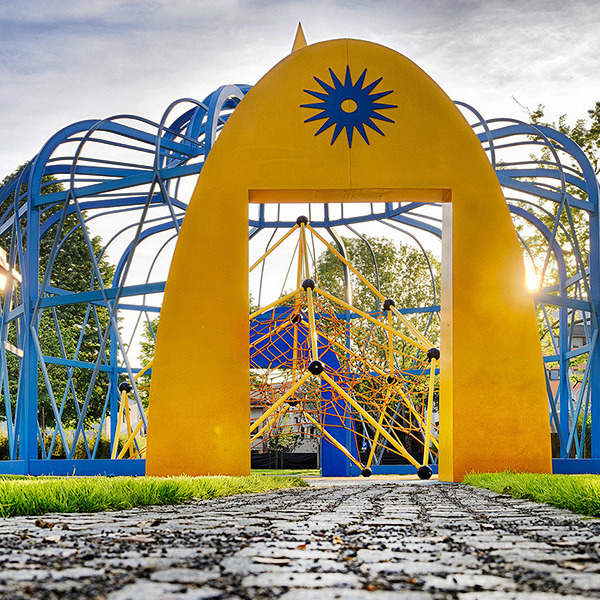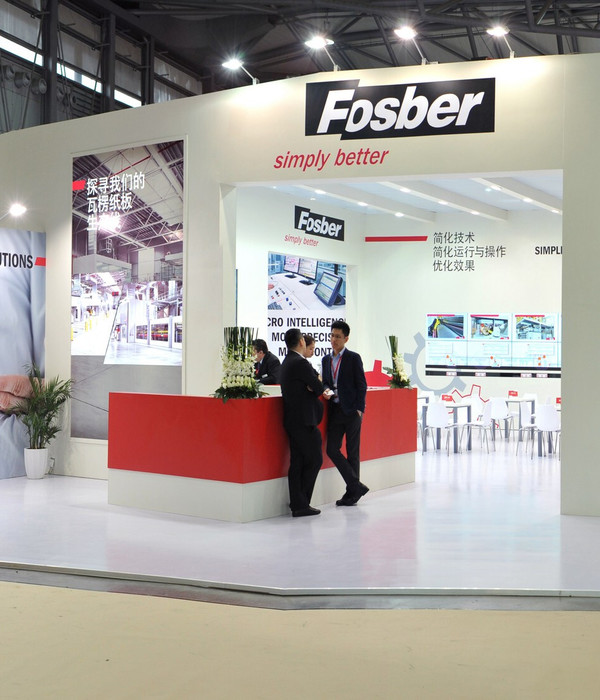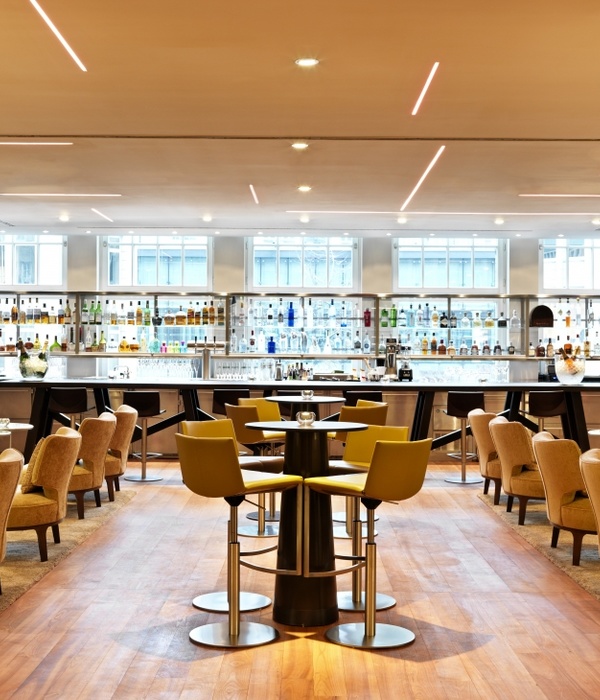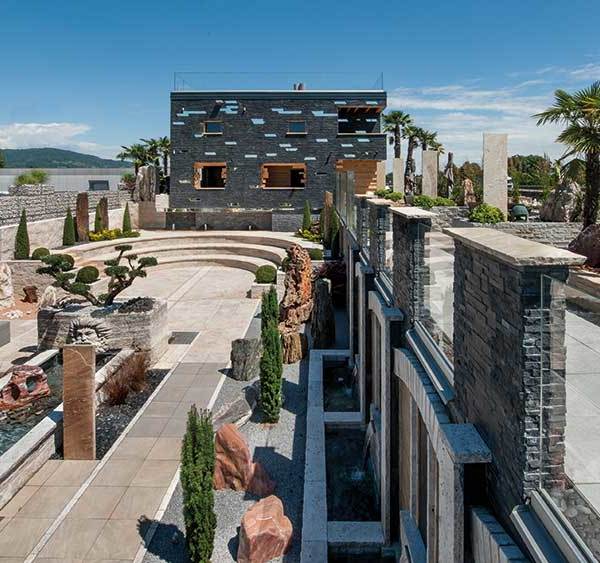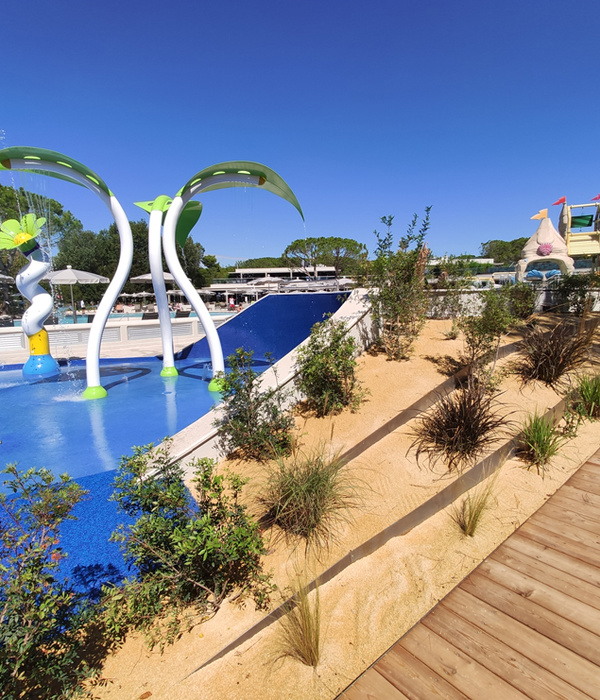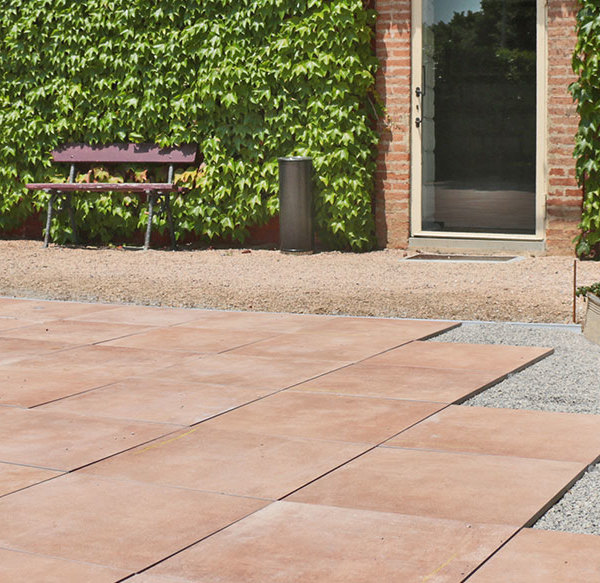东莞中心公园作为东莞国际商务区的中心公园自立项以来备受各界瞩目,公园位于东莞国际商务区中央绿轴与新基 河蓝轴的交汇的中心,占地面积 220,000 ㎡,将分两期建设,于近期竣工的南部一期以生态景观为主,占地面积 126,118 ㎡, 开园后将成国际商务区集生态、艺术、文化、商业等多功能与一体的中央活力绿心和城市活力舞台。
Interlinking the Dasha River Ecological Corridor and the No. 2 Provincial Greenway, Xili Lake Greenway has integrated itself into the network of Guangdong Province‘s “Ten-Thousand-Kilometer Blueway” system. This achievement orchestrates the convergence of diverse greenway systems, catalyzing the protection of regional ecological green spaces and the establishment of an ecological network. The Greenway traces its course around Xili Lake and traverses the expanse of Dasha River, establishing connections between nature reserves, forest parks, country parks and lake reservoirs, and thus forges a holistic haven that accommodates nearly ten thousand species of wild flora and fauna whilst encouraging the harmonious coexistence of humankind and the natural world.
▼水杉栈道 & 观景亭鸟瞰,Overall of the project © DID Studio
生境重建 还原东莞生态记忆 Habitat Restoration: the rekindling of Dongguan’s ecological legacy
东莞中心公园理念核心围绕生态系统的构建和自然生境的重现。公园内多选用乡土树种,建立本土栖息地,实现岭南四季的繁华景象;重视保护现有的古树名木,改造前新基河旁丛生的榕树,如今已成为公园内一片葱绿景致。
The core concept of Dongguan Central Park lies in the construction of an ecosystem and the reinvigoration of natural habitats. The park largely embraces native tree species, cultivating local habitats that capture the vibrant sceneries of Lingnan’s four distinct seasons. The preservation of venerable ancient trees also holds great significance: the once thickets of banyan trees by the pre-renovated Xinji River have now become a verdant spectacle within the Park.
▼生态湿地,Ecological Wetlands © DID Studio
在新基河河道基础上进行拓宽改造形成的鹭鸟湿地,汇集了极具观赏性并带有净化水质和去污功能的20余种水生植物,改善新基河水质,结合布置于湿地之上的栖木、枯木、石头打造湿地景观,同时也为候鸟和各类昆虫等陆生水生动物提供了多样性的栖息庇护所 , 力求还原东莞的生态记忆。
The Egret Wetland developed from the expansion and transformation of the Xinji River has gathered over twenty species of aquatic plants that couple aesthetic appeal with water purification and pollutant removal functions to ameliorate the water quality of the Xinji River. The wetland landscape is further enhanced by the inclusion of perches, dead wood and rocks, serving as a habitat and sanctuary of diversity for migratory birds, insects of all sorts and other terrestrial and aquatic creatures, aspiring to recapture the ecological memory of Dongguan.
▼生态湿地与亲水平台,Ecological wetland and waterfront platform © DID Studio
▼桥梁,Bridges © DID Studio
绿色纽带 连接城市智慧人文 Green Linkage: the bridge between smart city and humanities
连续的生态廊道和生态慢行系统将公园与城市紧密相连。同时环心漫道是东莞中心公园的主园路串联起园区内各个景观节点全长约1.3km,宽6m,包括3.5m的人行漫道和2.5m的跑道。道路两侧种植遮阴乔木,并设置休憩廊架和直饮水设施,营造自然舒适的漫步环境,沿路随处可见的智慧设施,可供游客查询公园路线、生成AI游记。
The network of continuous ecological corridors and slow-traffic system weaves the park with the city. Meanwhile, the Central Ring Path, as the major pathway of Dongguan Central Park, threads together various scenic nodes within the park. Extending approximately 1.3 kilometers, this 6-meter-wide pathway comprises a 3.5-meter-wide pedestrian walkway alongside a 2.5-meter-wide jogging track. Adorned with shade trees on either side, pergolas for rest and potable water facilities scatter along the pathway, which creates a naturally inviting ambiance for easy strolls. Throughout the path, smart facilities are set up for the visitors to access park routes and generate AI-assisted journals.
▼公园鸟瞰,Bird ‘s-eye view of the park © HOPE翰博设计 品牌中心
▼水杉栈道,Metasoia Boardwalk © DID Studio
位于公园东南侧的活力阶梯是人们户外集聚、交互的场地。乔木和鲜花、植被穿插于层层叠退的石座台阶之间,也实现了硬质材质和自然的舒缓过渡。在东莞中心公园中还保留了场地旧时村落的记忆。曾经用于水涧头村房屋的数万块高龄瓦片被完好地保留下来,如今成为了公园南区、西广场两侧树荫下的小径,承载着独属于这片场地的文化记忆。
Situated on the southeast side of the park, the Vitality Steps serve as an open-air gathering place for interaction. Towering trees, vibrant flowers and lush vegetation are interwoven between tiers of receding stone steps, providing a gentle transition between hardpaving and nature. Within Dongguan Central Park, echoes of the site’s former village history are preserved. Tens of thousands of weathered tiles, once integral to the dwellings of the Shuijiantou Village, have been impeccably conserved. Today, they form pathways beneath the shade of trees in the Park’s south section and the both sides of the west plaza, bearing the cultural memories unique to this very plot of land.
▼自然体验花园,Nature Experience Garden © DID Studio
▼阶梯鸟瞰图,Aerial view of the steps © DID Studio
▼草坪台阶,Lawn steps © DID Studio
水岸再生 打造生态亲水体验 Waterfront Regeneration: the crafting of an ecological waterside experience
坐落于园内的中心湖不仅是东莞中心公园的核心景观,更是一个百年雨洪保护的屏障,为东莞国际商务区提供了海绵支撑。它能够收集地表径流雨水,并通过生态净化处理,建立洁净可持续的活力水岸体系。此外,在极端暴雨天气下, 中心湖与新基河的鹭鸟湿地可合二为一,兼顾防洪调蓄功能,解决城市内涝问题。
Nestled within the park, the central lake not only constitutes the pivotal panorama of Dongguan Central Park but also serves as a century-long shield against torrential rains, providing the Dongguan International Business District with its sponge city resilience. Adept in collecting surface runoff rainwater and the following ecological purification processes, it helps to establish a secure and sustainable waterside system with exuberance. Moreover, during extreme rainfall weathers, the central lake and the Xinji River’s Egret Wetland will combine to serve both flood control and storage functions, thereby mitigating urban waterlogging issues.
▼中心湖,Central Lake © DID Studio
中心湖的自循环系统巧妙地利用了地形高差与跌级水坝的结合,设计使用输水管水泵将湖水送至出水分配器,再由分配器将湖水均匀送至生态净化群落表层;经过水生植物的吸附及过滤层的垂直过滤净化后,湖水被收集到雨水井中, 通过井内的输水管送往下一级生态净化群落进行处理;水体经过多级处理后回流至中心湖形成闭合循环水路。
The self-circulating system of the central lake utilizes the topographical elevation difference associated with stepped water barriers. This design employs water delivery pumps to convey lake water to the outlet distributor, subsequently diffusing it evenly across the upper layer of the ecological purification community. After the aquatic plants’ adsorption and the filter layers’ vertical purification, the water is collected into catch basins and then released through pipeline systems within the wells to the next tier of the ecological purification community for further treatment. The water, following multi-stage treatment, is returned to the central lake, thus establishing a closed-loop water route.
▼草坪,The lawn © DID Studio
▼亲水空间,Hydrophilic space © DID Studio
设计采用“土壤生物工程技术”对新基河的沿岸进行生态改造。利用植物、木桩、柳条、自然降解的椰网与天然景石结合打造的软质岸线可以通过岩石控制土壤流失、减缓水流速度,而植物除了起到美观的作用外,其根系还可以捆附岩石,加固河岸,既减少后期岸线维护费用和工作,亦有利于生态环境和生物多样性;同时软质岸线的设计也为创造更多的亲水景观和休闲空间提供了可能,围绕着湖畔,漂浮亭、湖畔草坪、亲水栈道等不同尺度的亲水空间被巧妙地布置, 提供了人与水的互动体验,也将成为人们赏湖观景、亲近自然、停留休憩的绝佳场地。
For the ecological upgrading of the Xinji River’s banks, the design embraces “soil bioengineering technology” which elaborates a soft shoreline formed by vegetation, wooden piles, willow branches, biodegradable coconut fiber netting and natural landscape rocks. This approach effectively manages soil erosion and reduces water flow velocity through the stone part, whilst beyond aesthetics, plants not only contribute to visual appeal but also affix themselves to rocks, reinforcing the riverbanks to lessen long-term bank maintenance expenses and work, bolstering the ecological environment and biodiversity as well. Meantime, the soft shoreline design enhances the potential for creating additional waterside landscapes and leisure spaces. Circling the waterfront, floating pavilions, lakeside lawns, waterside boardwalks and various other lakefront spaces are artfully arranged, presenting opportunities for interactive experiences between people and water, and also offer a platform for visitors to enjoy lakeside vistas, connect with nature, and pause for respite.
▼栈道,Plank road © HOPE翰博设计 品牌中心
活力舞台 呈现生活多样魅力 Vitality Stage: the unveiling of a charming multifaceted living
位于东莞中心公园西侧的童趣花园,是孩子们畅游、嬉戏的天地。设计利用独特的艺术地形推坡,保证了儿童活动场地的独立性与安全性。选用石头、原木、沙子等取之自然的材质与儿童游乐设施巧妙融合,营造出了一个探索自然的乐园。
Situated on the west side of Dongguan Central Park, the Children’s Joy Garden provides a play and exploration for the young. The design employs distinctive artistic topography and slopes to ensure the independence and safety of children’s activity spaces. Natural materials such as stones, timber and sand are cleverly integrated with the play equipment, fostering an environment for the kids to explore the natural world.
▼童趣花园,Children’s Joy Garden © HOPE翰博设计 品牌中心
东莞中心公园南区的西南广场是园区的重要城市界面之一,它不仅起到了集散人流的作用,也是公园景观的视线通廊,将人的视野由入口广场、艺术展示空间、艺术草阶,层层引入公园腹地。这里亦是公园内文化艺术宣传的窗口区, 一系列关于创意、艺术、文化、社交等丰富的主题活动将持续在此展开。
The southwest square in the south section of Dongguan Central Park showcases one of the park’s crucial urban interfaces. It serves not only as a hub for the distribution of the crowd but also as a visual corridor of the park’s landscapes, leading the attention from the 10 entrance plaza to the art display area and the artistic grass steps, thereby progressively introducing visitors into the heart of the park. Additionally, it functions as a window for cultural and artistic promotion within the park, where a series of diverse thematic events centered on creativity, art, culture, and social engagement will continue to unfold.
▼森之空间鸟瞰,Bird’s eye view of Mori Space © DID Studio
未来,东莞中心公园还将成为一个充满活力的城市社交场所,不仅会持续举办音乐会、艺术展和小剧场等主题活动, 更会不断探索和推出更多具有创意的节日庆典,让市民及游客在这里享受到充满缤纷活力的生活和文化体验,并以其以人为本、绿色低碳、智慧融合的建设理念,搭建人与城市、自然的桥梁,为东莞国际商务区注入无限活力。
In the future, Dongguan Central Park will mature into a dynamic urban social hub. It will host ongoing themed events such as concerts, art exhibitions, and mini theaters, beyond which, consistent exploration into innovative festive activities is also to be expected. This endeavor will offer citizens and visitors a vibrant life and cultural experience filled with color and vigor. Anchored in its construction philosophy integrating people-oriented, green, low-carbon and intelligent principles, the park will link individuals with the city and bridge nature with culture, infusing boundless energy into the Dongguan International Business District.
▼局部鸟瞰,Partial bird ‘s-eye view © HOPE翰博设计 品牌中心
项目名称:东莞中心公园 项目地点:广东东莞 项目规模:126,118 ㎡(一期) 业主:东莞市中心城区建设现场指挥部 东莞市城建工程管理局 代建单位:华润置地(深圳)有限公司东莞片区公司 设计总承包:深圳翰博设计股份有限公司(景观) 中国建筑科学研究院有限公司(建筑) 林同棪国际工程咨询有限公司(桥梁) 合作单位:Henning Larsen ( 原安博戴水道 )(景观) 图片版权:DID Studio、HOPE 翰博设计品牌中心
Project Name: Dongguan Central Park Project location: Dongguan,Guangdong Province Project scale: 126,118 ㎡ (Phase I) Coordinated by: Dongguan City Center Construction Site Command Headquarters Client: Dongguan Urban Construction Engineering Management Bureau Construction agency: China Resources Land (Shenzhen) Co., Ltd. Dongguan Area Company Design General Contract: Shenzhen Hope Design Co., Ltd. (Landscape) China Academy of Building Research (CABR)( Architecture) T.Y. Lin International Group(Bridge) Design collaborators: Henning Larsen (formerly Ramboll Studio Dreiseitl) (Landscape) Shing & Partners Design Group( Architecture) Photography: DID STUDIO、Hope Design Brand Center
{{item.text_origin}}

